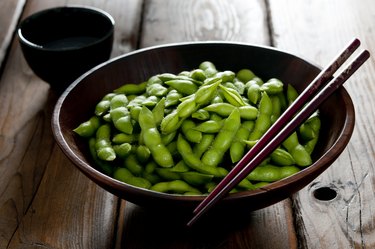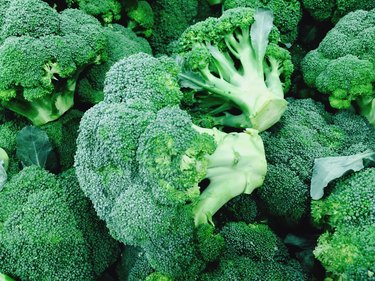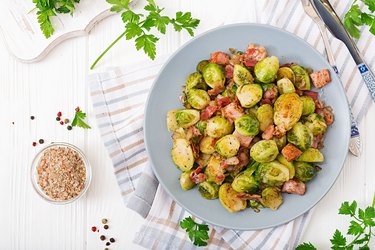Broccoli, a cruciferous vegetable, is a nutritional powerhouse, offering an array of essential vitamins, minerals, and antioxidants. Understanding what constitutes a serving of broccoli is crucial for incorporating this nutrient-rich vegetable into a balanced diet.
Definition of a Serving
According to the United States Department of Agriculture (USDA), one serving of vegetables is equivalent to:
- 1 cup of raw or cooked vegetables
- 2 cups of leafy greens
Broccoli Serving Size
Based on the USDA’s definition, one serving of broccoli is:
- 1 cup of cooked, fresh, or frozen broccoli florets
- About 8-10 broccoli florets
Importance of Serving Size
Consuming the recommended serving size of vegetables, including broccoli, is essential for several reasons:
- Nutrient Intake: Vegetables provide a wide range of nutrients, including vitamins, minerals, fiber, and antioxidants. Consuming adequate servings ensures the body receives these essential nutrients.
- Disease Prevention: Vegetables have been linked to a reduced risk of chronic diseases such as heart disease, stroke, and certain types of cancer.
- Weight Management: Vegetables are generally low in calories and high in fiber, which promotes satiety and supports weight management.
Tips for Incorporating Broccoli into Your Diet
Here are some tips for incorporating broccoli into your daily meals:
- Add to Salads: Raw broccoli florets can add crunch and nutrition to salads.
- Steam or Roast: Steaming or roasting broccoli florets preserves their nutrients while enhancing their flavor.
- Stir-Fry: Broccoli can be stir-fried with other vegetables and lean protein for a quick and healthy meal.
- Soups and Stews: Broccoli can be added to soups and stews for extra nutrition and texture.
- As a Snack: Raw broccoli florets can be enjoyed as a healthy snack with hummus or other dips.
Understanding what constitutes a serving of broccoli is essential for reaping the nutritional benefits of this cruciferous vegetable. Aiming for one serving of broccoli per day can contribute to a balanced and healthy diet. By incorporating broccoli into various meals and snacks, individuals can enjoy its nutritional value and support their overall well-being.
Broccoli Calories and Fiber
One serving of broccoli is one cup, raw or cooked. One cup of raw broccoli has just 35 calories, according to the USDA, which makes it a low energy-dense food. Energy density is a measurement of the amount of calories a food has per gram of weight. Low energy-dense foods are helpful for losing and maintaining your weight because you can eat more of them without going over your calorie budget.



Video of the Day
One cup of broccoli also has 2.4 grams of fiber, or “roughage.” Broccoli is rich in a particular type of fiber called insoluble fiber. The body cant digest insoluble fiber, and it moves through your digestive system mainly intact.
Insoluble fiber plays an important role in digestive health because it adds bulk to your stool and helps it move more easily through the digestive tract. This promotes regularity and prevents constipation. Eating enough fiber may also help lower your risk of hemorrhoids, diverticular disease and colon cancer. Women need 25 grams of fiber each day, and men need 38 grams, according to the Dietary Guidelines 2015-2020 for Americans.
With very little fat content, broccoli provides a respectable amount of protein for a vegetable. With about 2. About 30% of the calories in broccoli are derived from protein, which amounts to 5 grams per cup. Plant foods high in protein are essential for people who don’t eat animal products to reach the daily requirement of 46 grams of protein for women and 56 grams for men.



Whether from animals or plants, your body needs the amino acids in protein to build new proteins in the body. Protein creates strong muscles and bones and supports immune function. As an enzyme, its also necessary for the thousands of chemical reactions that take place in cells. Messenger proteins carry signals that help facilitate many different biological processes throughout the body.
Read more: How Protein Can Help You Lose More Weight
Vitamins C, K and Folate
Just one cup of broccoli provides more than half of the vitamin C an adult needs each day. Vitamin C is well-known for its role in immune system function, and its required for the synthesis of collagen, which forms the main structural tissues of the body. It also aids wound healing and acts as an antioxidant — a substance that helps neutralize free radicals that can damage healthy cells and promote disease.
Additionally, broccoli is a great source of the B vitamin folate. About 14% of the daily folate required by men and women and nearly 10% by pregnant women can be found in one cup of broccoli. Because folate can lower the risk of birth defects, it is especially important for women who are pregnant or intend to become pregnant.
Vitamin K is abundant in broccoli, with one cup providing more than 100 percent of the recommended daily intake for women and about 83 percent of the recommended daily intake for men. Vitamin Ks most important function is to encourage normal blood clotting. Its also involved in bone mineralization and turnover.
Phytochemicals in plant foods arent considered essential nutrients, and they arent assigned recommended daily intakes. But they play powerful roles in human health.
Like other vegetables in the cruciferous family — cauliflower, kale, radishes and Brussels sprouts, for example — broccoli is particularly rich in sulfur-containing substances called glucosinolates. During digestion and metabolism, glucosinolates are broken down into biologically active compounds that researchers have studied for their anticancer effects, according to the National Institutes of Health.
These compounds may have antibacterial, antiviral, and anti-inflammatory qualities in addition to helping shield cells from DNA damage, deactivate carcinogens, cause cell death, and stop the spread of cancer cells. More investigation is necessary to validate these effects in people, though.
Don’t worry about overindulging in broccoli; have it for breakfast, lunch, and dinner as long as you keep it nutritious. The goal of eating more broccoli in your diet will be defeated if you drown it in cheese, oil, or butter.
Broccoli is best prepared simply by steaming it and tossing it with fresh herbs and lemon juice. Broccoli can also be grilled over an open flame, stir-fried with a little sesame oil and a lean protein source like chicken or tofu, or tossed in a small amount of olive or avocado oil and baked. Additionally, low-fat Greek yogurt ranch or hummus are great dips for raw broccoli, so make a big batch for a nutritious midafternoon snack.
Is there an upper limit to broccoli sprout consumption? | Jed Fahey
FAQ
How much is a serving of broccoli?
What counts as a portion of broccoli?
How much broccoli should one person eat?
How many servings is one head of broccoli?
What is a 1Cup serving of broccoli?
A 1-cup serving of broccoli is one medium stalk, which is about the size of a hairbrush. With 4 grams of protein and fiber, according to the USDA, a serving of broccoli can help you feel full and keep you regular.
What is the recommended amount of broccoli to eat?
There is not a defined recommendation of the amount of broccoli to ear. Some studies recommend 2 or 3 servings of broccoli (or other cruciferous vegetables) per week. Others show results that broccoli once a week may be enough to reduce the risk of developing certain types of cancers, like prostate cancer.
How many calories are in a cup of broccoli?
A typical broccoli serving size is 1 cup. One serving of broccoli is one cup, raw or cooked. One cup of raw broccoli has just 35 calories, according to the USDA, which makes it a low energy-dense food. Energy density is a measurement of the amount of calories a food has per gram of weight.
How much protein is in a cup of broccoli?
With about 2.5 grams per cup, roughly 30 percent of the calories in broccoli come from protein. For those who don’t eat animal foods, protein-dense plant foods play a crucial role in meeting the daily recommended intake of 46 grams of protein for women and 56 grams for men.
